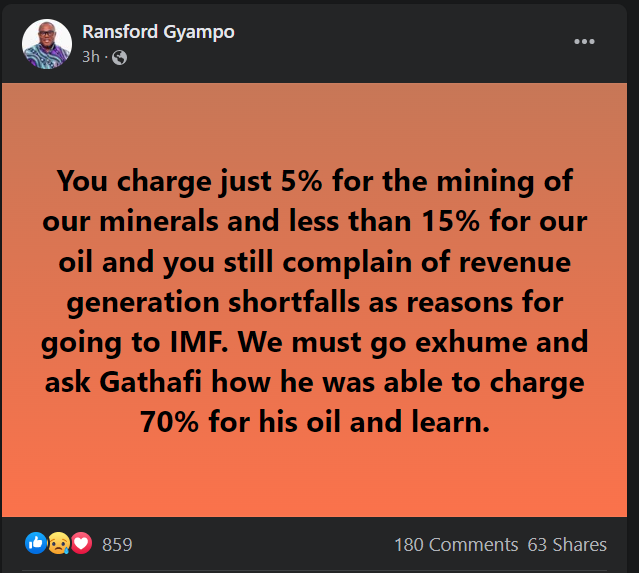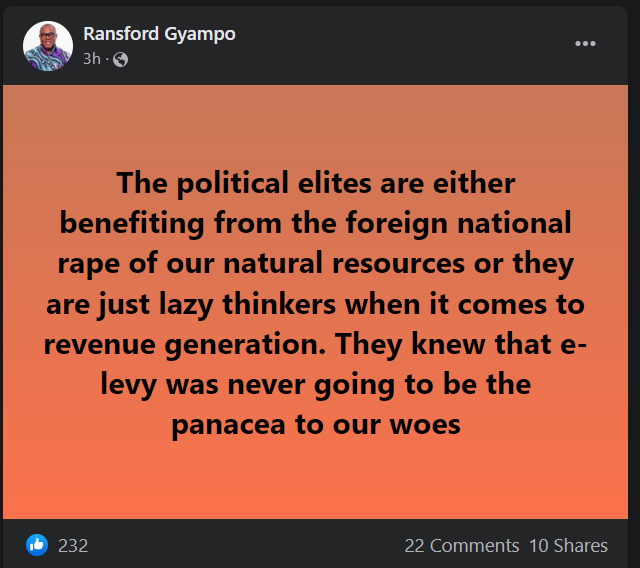A political scientist, Professor Ransford Gyampo has urged government to take a cue from other countries on how to manage its natural resources such as gold and oil.
According to him, the country’s failure to utilise its resources efficiently is the reason for the revenue shortfalls which has necessitated an IMF bailout.
Speaking to Myjoyonline.com on the back of an earlier Facebook post on Friday, he reiterated that the country may have to take inspiration from how leaders like the late Libyan head of state, Muammar Gaddafi made the best from Libya’s oil resource.
“You charge just 5% for the mining of our minerals and less than 15% for our oil and you still complain of revenue generation shortfalls as reasons for going to IMF. We must go exhume and ask Gathafi how he was able to charge 70% for his oil and learn”, he wrote.

As a sequel to the above, he added that, Ghana’s inability to fully benefit from its natural resources could be attributed to a lack of deep thinking on the part of the country’s leaders, or the other parochial considerations.
“The political elites are either benefiting from the foreign national rape of our natural resources or they are just lazy thinkers when it comes to revenue generation. They knew that e-levy was never going to be the panacea to our woes”, he noted.

Ghana is currently in talks with the International Monetary Fund (IMF), for economic support, in the wake of the country’s fiscal distress.
This development has been met with a lot of reactions, with some heavily criticising the government over the move.
Touching on this development, Professor Gyampo said Ghana derives very little from its natural resources, hence the need for government to renegotiate the proceeds it derives from gold and oil.
Meanwhile, former Finance Minister, Seth Terkper has suggested that Ghana can avoid an IMF bailout if it keeps enough money in the Petroleum Fund.
He said if more revenue had been accrued in the Fund through Value Added Tax (VAT) and petroleum revenues, Ghana would not have to seek the IMF’s assistance after exiting the last programme in 2018.
“We shot ourselves in the foot by not remaining faithful with the Petroleum Revenue Management Act, and its provisions, which is the structure that other countries put in place together with other initiatives and that’s the way forward”, he stated.
“There’s no other easy way, it involves some sacrifice of present consumption to be able to build a more stable future and buffers, which we can when the times are good”, Mr Terkper added.
The former Minister said this during a media interaction following government’s decision to engage the IMF for a Balance of Payment (BoP) support programme.
In his submissions, he also underscored that strict compliance with the Petroleum Revenue Management Act would be critical for the present and successive governments in ensuring that the country does not find itself in an economic crisis, which would push it to the IMF.
When asked about areas that could come up for discussion between the government and the Bretton Woods institution, he said that the conditionalities to be imposed on Ghana would be known after government’s negotiations with the Fund.
The Tax Professional noted that the possible areas that could come up for discussion include the Free Senior High School (Free SHS) programme and the nursing and teacher trainee allowances.
Mr. Terkper emphasised that: “Another area could be the financing of the budget deficit by the Bank of Ghana (BoG), and the Fund may want to know and discuss how long the government intends to use this approach”.

